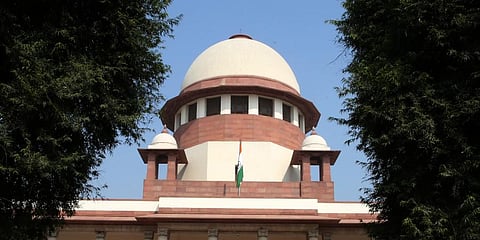

NEW DELHI: The Supreme Court Thursday said it would hear next week a plea seeking a direction to the Centre to remove "anomalies" in the grounds of adoption and guardianship and making them uniform for all citizens.
The plea came up for hearing before a bench, comprising Chief Justice S A Bobde and Justices A S Bopanna and V Ramasubramanian, which said that the matter be listed next week.
The plea, filed by advocate and BJP leader Ashwini Kumar Upadhyay, has sought to declare that the "discriminatory grounds" of adoption and guardianship are violative of Articles 14, 15, 21 of the Constitution and also to frame "uniform guidelines" for adoption and guardianship for all citizens.
Article 14 of the Constitution deals with equality before the law, Article 15 prohibits discrimination on grounds of religion, race, caste, sex or place of birth and Article 21 deals with protection of life and personal liberty.
The plea, filed through advocate Ashwani Kumar Dubey, has alleged that current practice of adoption is blatantly discriminatory as Hindus have a codified law of adoption but Muslims, Christians and Parsis don't.
"Adopted child has the right to inherit property under the Hindu law but not under the Muslim, Christian and Parsi law. Adopted child by the Hindus can become a legal heir whereas adopted child by Christians, Muslim, Parsis cannot," the plea said.
"Adopted child by Hindus turn equivalent to a biological child of adoptive parents whereas it's just the opposite in Muslims, Christians and Parsis. Adoptive parents can be the natural guardian of the adopted son and his wife under Hindu Law but not in Muslim, Christian and Parsi Law," it said.
It has also sought directions to the Law Commission to prepare a report on 'Uniform Grounds of Adoption & Guardianship' within three months, while considering the best practices of laws and international conventions.
The PIL stated that adoption and guardianship is one of the most important and crucial aspects of human life but even after 73 years of independence, India does not have a gender-neutral and religion-neutral law of adoption and guardianship for all citizens.
"Muslims, Christians and Parsis don't have adoption laws even after 73 year of independence and 71 years of India becoming a democratic republic. Due to lack of a common law for all, Muslims, Christians, Parsis approach the Court under Guardians & Wards Act, 1890," the plea said.
"Muslims, Christians and Parsis can take a child under the said Act only under foster care. Once a child under foster care becomes major, he can break away all his relations. Moreover, such a child doesn't have the legal right of inheritance, which creates a lot of hardship and confusion among citizens, which can very easily be solved by having uniform law of adoption and guardianship for all citizens," it said.